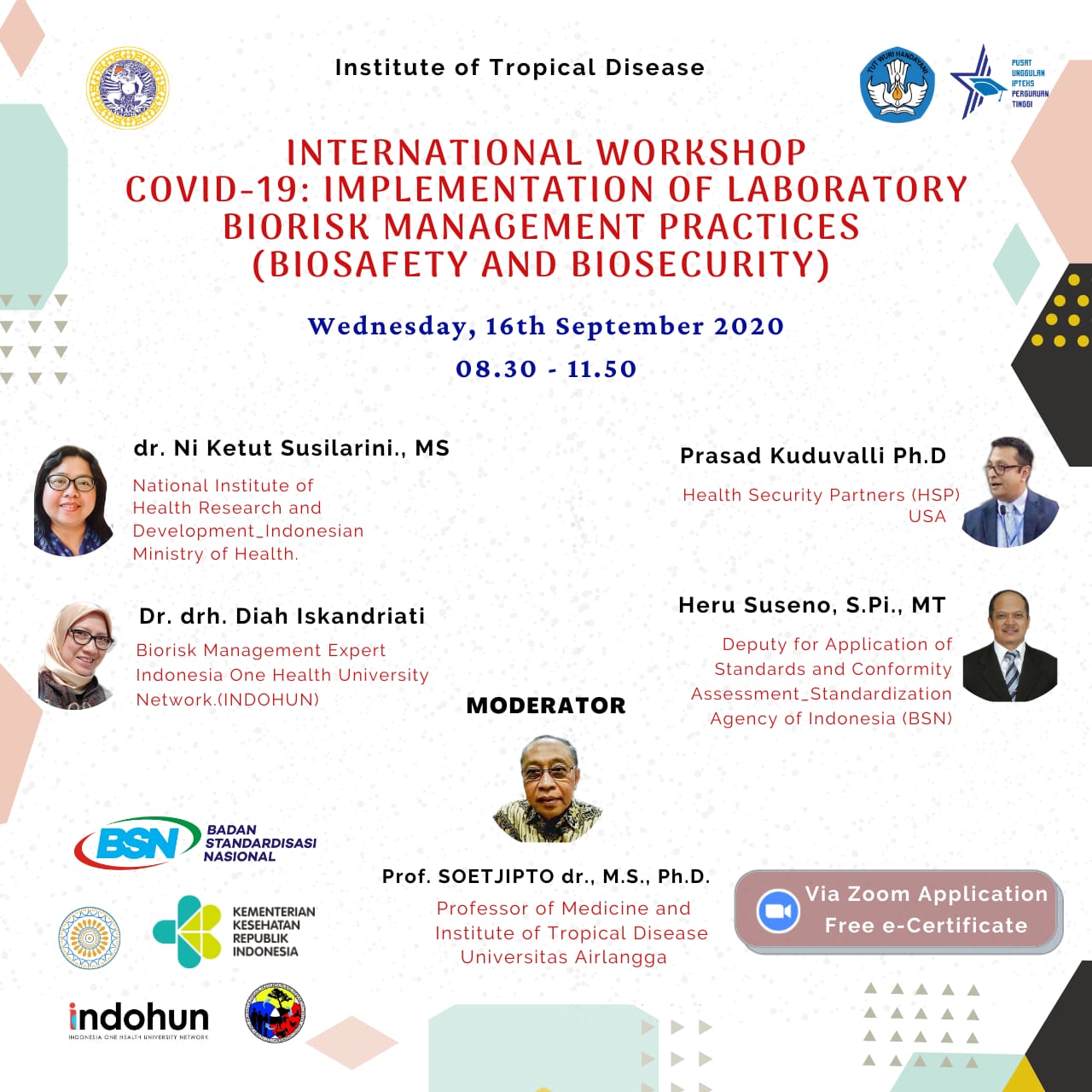 HSP’s own Dr. Prasad Kuduvalli gave a Biosecurity lecture at an International BioRisk Management workshop hosted by the Institute of Tropical Disease, Airlangga University. The virtual workshop focused on how laboratory biorisk management best practices should be implemented during the COVID-19 pandemic in order to reduce the likelihood of lab-acquired infection or potential misuse of the pathogen.
HSP’s own Dr. Prasad Kuduvalli gave a Biosecurity lecture at an International BioRisk Management workshop hosted by the Institute of Tropical Disease, Airlangga University. The virtual workshop focused on how laboratory biorisk management best practices should be implemented during the COVID-19 pandemic in order to reduce the likelihood of lab-acquired infection or potential misuse of the pathogen.
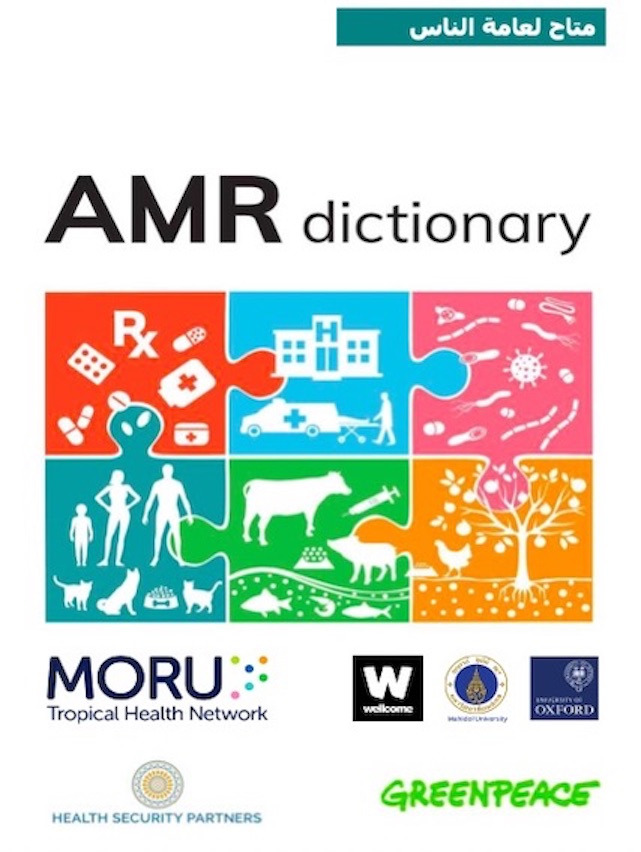 The Arabic version of the Antimicrobial Resistance (AMR) Dictionary, which was translated by HSP’s Iraq Fellows, has been presented to Iraq’s Prime Minister and President of Parliament. The recently translated tool was presented to them by Iraq’s Minister of Higher Education and Scientific Research.
The Arabic version of the Antimicrobial Resistance (AMR) Dictionary, which was translated by HSP’s Iraq Fellows, has been presented to Iraq’s Prime Minister and President of Parliament. The recently translated tool was presented to them by Iraq’s Minister of Higher Education and Scientific Research.
HSP is working as part of the United Kingdom (UK) Fleming Fund’s efforts to better understand the levels of antimicrobial resistance (AMR) in bacteria found in food animals. AMR is an evolution in viruses, bacteria, and other pathogens that makes them resistant to drugs they have been exposed to repeatedly.
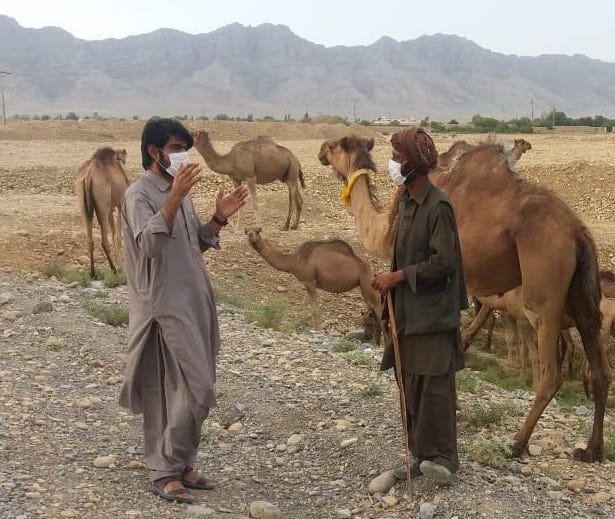 HSP Partner, the Association for Biorisk Management (ABM) is providing basic COVID-19 safety training to camel herders in the Loralai district of Balochistan. In this region, camel herding is an important part of the economy because it provides food and income to people in remote, desert or mountainous areas. However, in order to feed the camels these herders must be constantly nomadic, creating a means of spread for COVID-19 throughout the region.
HSP Partner, the Association for Biorisk Management (ABM) is providing basic COVID-19 safety training to camel herders in the Loralai district of Balochistan. In this region, camel herding is an important part of the economy because it provides food and income to people in remote, desert or mountainous areas. However, in order to feed the camels these herders must be constantly nomadic, creating a means of spread for COVID-19 throughout the region.
HSP Partner Dr. Wafa Mufty, Directorate General of Health, is helping to support the COVID-19 response efforts by distributing personal protective equipment (PPE) to emergency medical personnel or the 1-2-2 in Duhok. Recently, Duhok has been seeing a 150-200 daily rise in new cases, creating a heightened need for PPE so their first responders can safely perform their frontline roles.
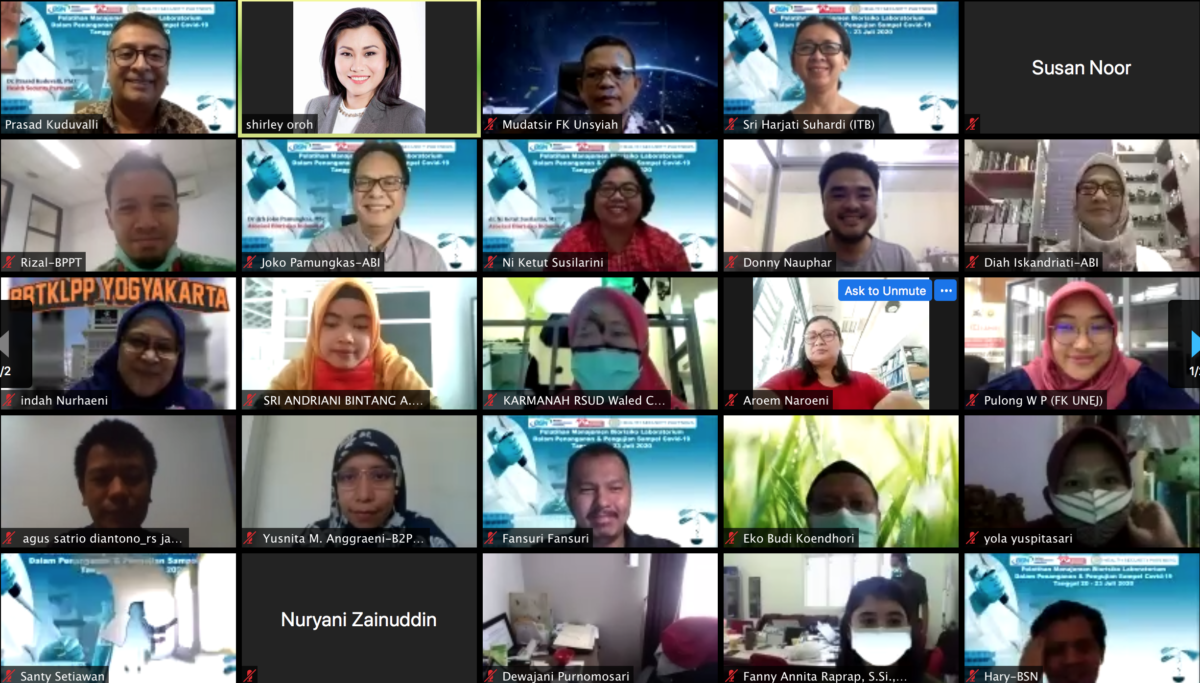 HSP is working with the Indonesian Biorisk Association (IBA) and the National Standardization Agency (BSN) to conduct week-long, intensive virtual training programs for labs that are new to COVID-19 testing. The program is comprised of a series of webinars by experts from both Indonesia and the U.S. on key topics in biosafety, biosecurity and testing quality.
HSP is working with the Indonesian Biorisk Association (IBA) and the National Standardization Agency (BSN) to conduct week-long, intensive virtual training programs for labs that are new to COVID-19 testing. The program is comprised of a series of webinars by experts from both Indonesia and the U.S. on key topics in biosafety, biosecurity and testing quality.
 HSP Partner, the Research Institute of Tropical Medicine-Biorisk Management Office (RITM-BRMO), is developing video content on their days off in order to help better train laboratory workers in the safest COVID-19 testing methods. The videos will consist of various training tools and job aids to facilitate COVID-19 testing and will help strengthen biosafety practices at testing sites across the Philippines.
HSP Partner, the Research Institute of Tropical Medicine-Biorisk Management Office (RITM-BRMO), is developing video content on their days off in order to help better train laboratory workers in the safest COVID-19 testing methods. The videos will consist of various training tools and job aids to facilitate COVID-19 testing and will help strengthen biosafety practices at testing sites across the Philippines.
HSP Partner Dr. Aysen Gargili-Keles, Marmara University, virtually convened a working group of experts to help develop a national standard for biosafety and biosecurity education in the country of Turkey. The group, which included experts from the Ministry of Agriculture Veterinary Institutes, TUBITAK, the Council of Higher Education (YÖK), and several Turkish universities, began to draft universal curriculum elements and laboratory procedures during the video teleconference.
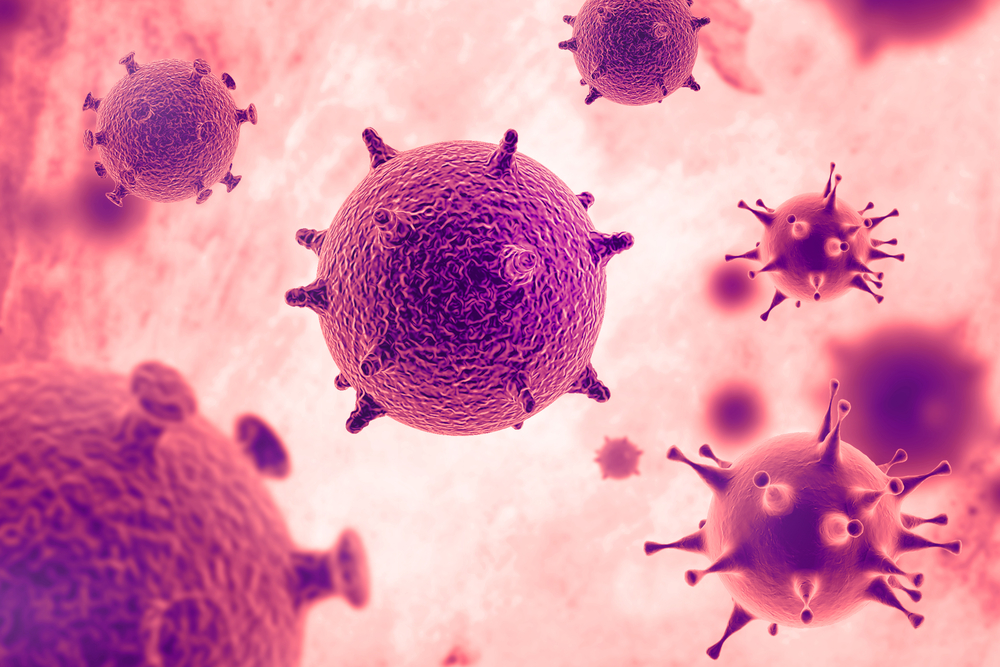 HSP Partners at the Central and Nangarhar Veterinary Diagnostic Laboratories (NVDRL), have not only been assisting the country’s efforts to contain its COVID-19 outbreak but they are also conducting surveillance on another highly fatal zoonotic disease in five different districts. Crimean-Congo Hemorrhagic Fever (CCHF) is a tick-borne disease that has some similar symptoms to COVID-19 in humans. It too has no vaccine.
HSP Partners at the Central and Nangarhar Veterinary Diagnostic Laboratories (NVDRL), have not only been assisting the country’s efforts to contain its COVID-19 outbreak but they are also conducting surveillance on another highly fatal zoonotic disease in five different districts. Crimean-Congo Hemorrhagic Fever (CCHF) is a tick-borne disease that has some similar symptoms to COVID-19 in humans. It too has no vaccine.
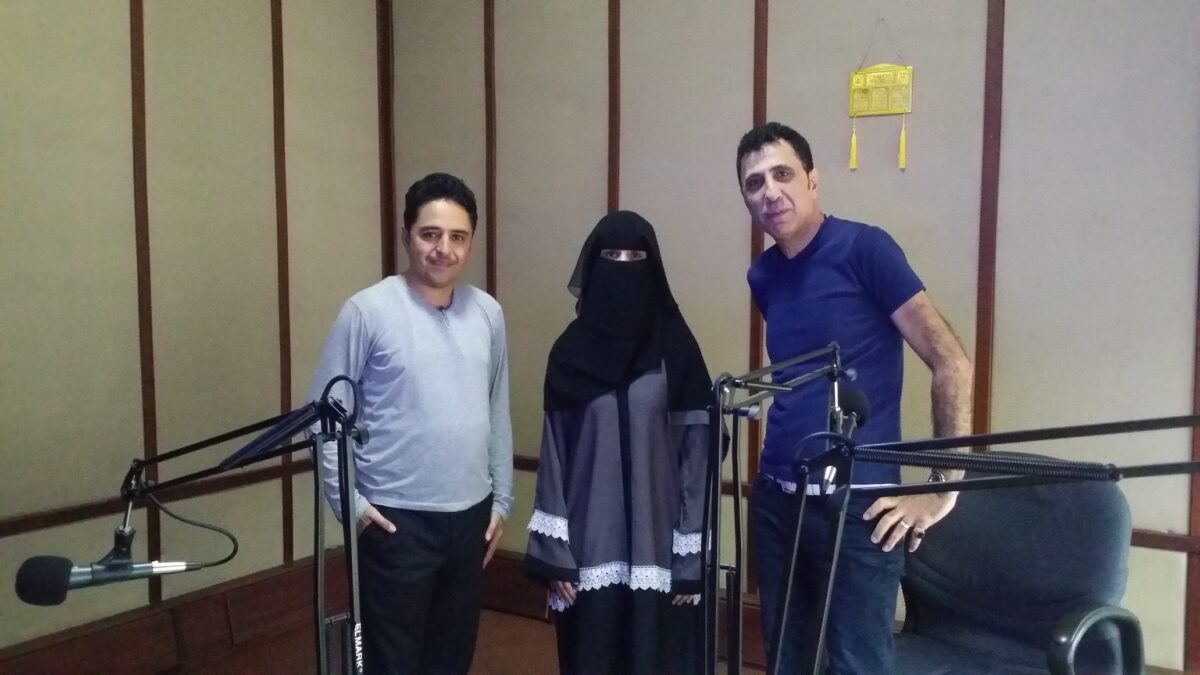 HSP Fellow Sumia Alturki, Head of Infection Control at Ez Aldeen Alshaibani Hospital in Sana’a, was recently interviewed about COVID-19 on Radio Yemen FM’s, “Your Health is Important” program, which is aired across the country. During her appearance, she discussed how one becomes infected, prevention measures, and the impact it has had on Yemen. Sumia and our other Health Security Futures Fellows are working hard to raise awareness about COVID-19 and are supporting Yemen’s response by leveraging local resources.
HSP Fellow Sumia Alturki, Head of Infection Control at Ez Aldeen Alshaibani Hospital in Sana’a, was recently interviewed about COVID-19 on Radio Yemen FM’s, “Your Health is Important” program, which is aired across the country. During her appearance, she discussed how one becomes infected, prevention measures, and the impact it has had on Yemen. Sumia and our other Health Security Futures Fellows are working hard to raise awareness about COVID-19 and are supporting Yemen’s response by leveraging local resources.
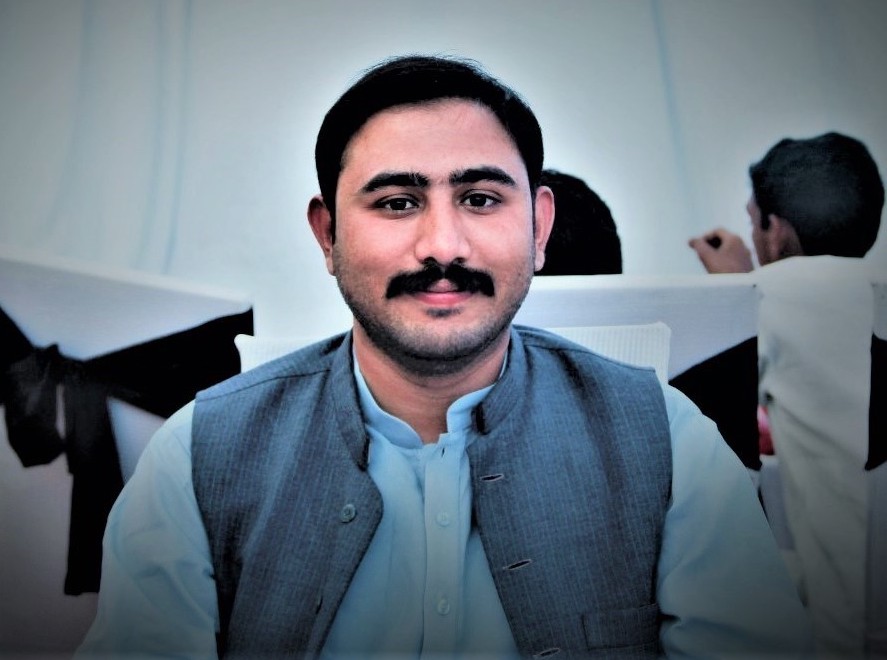 HSP Fellow Zargham Nawaz, Animal Quarantine Department (AQD), helped his organization receive a $800,000 (USD) public sector development funding grant from the Pakistani Government. The funding will go to building a facility with three new labs focusing on: Microbiology, Clinical Pathology, and Molecular Biology. These labs will be utilized to help the Animal Quarantine Department test animal and animal products that are imported into Pakistan, in order to prevent the spread of exotic diseases into Pakistan and to make sure all foods for human consumption are Halal.
HSP Fellow Zargham Nawaz, Animal Quarantine Department (AQD), helped his organization receive a $800,000 (USD) public sector development funding grant from the Pakistani Government. The funding will go to building a facility with three new labs focusing on: Microbiology, Clinical Pathology, and Molecular Biology. These labs will be utilized to help the Animal Quarantine Department test animal and animal products that are imported into Pakistan, in order to prevent the spread of exotic diseases into Pakistan and to make sure all foods for human consumption are Halal.
HSP partners at the Association for Biorisk Management (ABM) conducted a biosafety training with twelve medical professionals and local community leaders from the Tehsil Tangi district of Charsadda, a community of more than 400,000 people. The training focused on biosafety and precautionary measures that can be used to stop community-based transmission of COVID-19, as well as trust building exercises between the two groups.
HSP Partner Dr. Diah Iskandriati has enabled the Primate Research Center lab at the Bogor Agricultural University (IPB) in Indonesia to conduct COVID-19 testing. The lab is the first and currently the only testing site in Bogor, a city of 1.1 million people. Prior to the testing at this facility, specimens had to be sent all the way to Jakarta or Bandung to be processed.
Dr. Farida Lalani and Dr. Saba Savul, both HSP-supported experts, are working on behalf of the new Patient Safety Institute of the National Institute of Health, Islamabad (NIH). Along with other NIH experts they designed and held trainings for frontline workers like doctors, nurses, and medical facility housekeeping staff. These trainings covered topics like preventing healthcare associated infections (HAI), donning and doffing personal protective equipment (PPE), proper clean-up for biohazards, and use of post-exposure prophylactics (PEP) for diseases like HIV, Hepatitis B, and Hepatitis C.
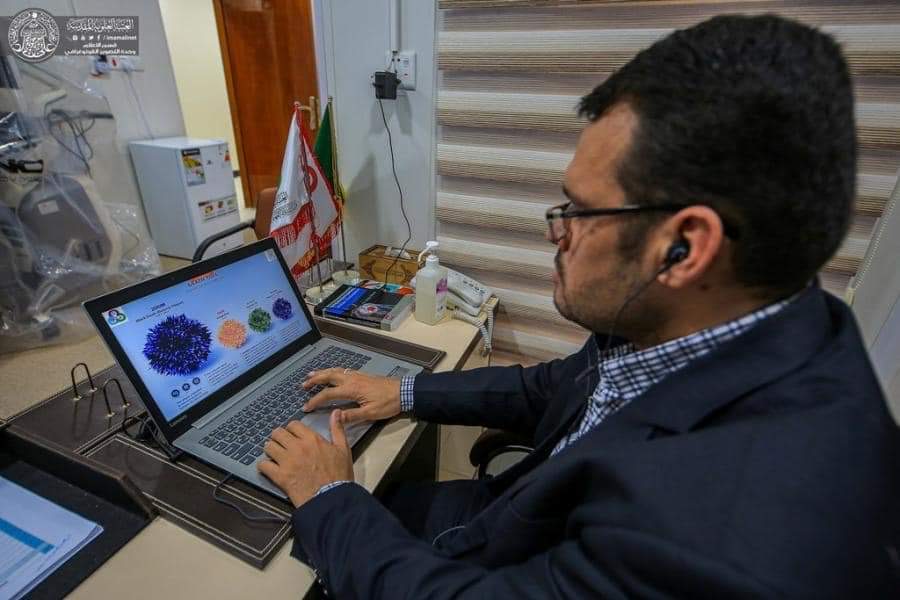 HSP Fellow Dr. Nawfal Al-Dujaili from the University of Kufa of Iraq, conducted a virtual workshop focused on One Health and Global Threats with 1,114 participants. The participants included university faculty, postgraduate students, as well as medical and health care professionals. The Q&A session explored the animal origin of COVID-19, its transmission to humans, and its spread across the globe.
HSP Fellow Dr. Nawfal Al-Dujaili from the University of Kufa of Iraq, conducted a virtual workshop focused on One Health and Global Threats with 1,114 participants. The participants included university faculty, postgraduate students, as well as medical and health care professionals. The Q&A session explored the animal origin of COVID-19, its transmission to humans, and its spread across the globe.
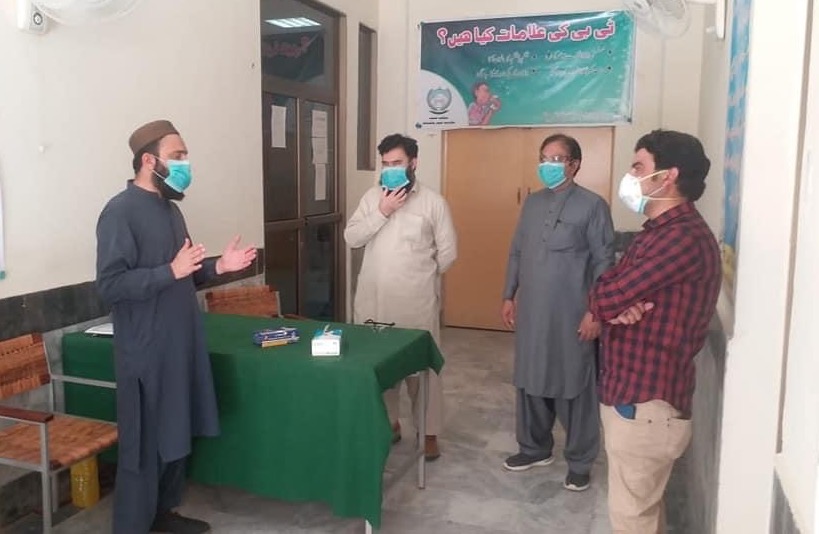 Our partner Dr. Javed Muhammad, Assistant Professor at University of Swabi, and Treasurer of the Pakistan Biological Safety Association (PBSA) is helping the Khyber Pakhtunkwa (KPK) government establish COVID-19 testing sites. One of the testing sites is being setup at Mufti Mehmood Memorial Hospital in Dera Ismail Khan. At this site, Dr. Muhammad, a microbiologist and expert in biosecurity and biosafety, has helped establish a complete PCR testing facility with separate reagents, specimen, and amplification rooms, as well as specimen transportation and waste management protocols.
Our partner Dr. Javed Muhammad, Assistant Professor at University of Swabi, and Treasurer of the Pakistan Biological Safety Association (PBSA) is helping the Khyber Pakhtunkwa (KPK) government establish COVID-19 testing sites. One of the testing sites is being setup at Mufti Mehmood Memorial Hospital in Dera Ismail Khan. At this site, Dr. Muhammad, a microbiologist and expert in biosecurity and biosafety, has helped establish a complete PCR testing facility with separate reagents, specimen, and amplification rooms, as well as specimen transportation and waste management protocols.
HSP collaborator Dr. Gina Itchon, Medical Officer IV at Northern Mindanao Medical Center (NMMC) and Associate Professor and Director of the Sustainable Sanitation Center, Xavier University, is supporting COVID-19 infection care at NMMC in Cagayan de Oro City, Philippines. In March, NMCC was designated as the hospital in the Northern Mindanao Region for quarantine and testing of persons who may be infected with the COVID-19 virus. In response to the emergency, staff updated Emergency Room SOPs. Patients with signs and symptoms are routed to a special triage area before entering the hospital.
HSP’s Dr. Fanaye Dadi, a health educator and physician, and two members of the Ethiopian Public Health Institute (EPHI), Dr. Eyasu Tigabu, and Mr. Negga Asamene recently traveled to Borena Zone in southern Ethiopia. Borena is home to a large pastoralist population where animals and humans live in close proximity and the zoonotic disease, brucellosis, is highly prevalent due to the local practice of drinking raw milk. HSP, EPHI, and the U.S. Centers for Disease Control and Prevention (CDC) are working together to develop a culturally-relevant behavioral intervention to interrupt human brucellosis transmission.
HSP has partnered with a team of Libyan experts led by Dr. Badereddin Annajar, General Director of the Libyan National Center of Disease Control (NCDC), to bolster biosafety and biosecurity systems in Libya. Despite the ongoing conflict in Libya, key One Health stakeholders are fully committed and enthusiastic about building health security capacity towards the implementation of the International Health Regulations (IHR 2005). The HSP team met with the Libyan team of experts from 24-26 February 2019, in Tunis, Tunisia. They jointly discussed the results of the Libya Joint External Evaluation (JEE) conducted last year to chart progress towards IHR implementation, identified gaps, reviewed current and planned efforts, and developed joint activities to bolster biosafety and biosecurity systems.
Laboratory professionals and researchers from eleven institutes across Pakistan, specifically from Punjab, Khyber Pakhtunkhwa, and Islamabad attended two consecutive bio-waste management workshops at the Center for Excellence in Molecular Biology (CEMB), University of the Punjab, Lahore. These workshops were organized in collaboration with CEMB, Gull’s Association, and HSP in an effort to train both laboratory personnel and house keeping staff on proper bio-waste management practices.
HSP worked with international and Cambodian partners to roll out the CBEP-funded workshop to create awareness and provide training to clinicians and laboratory professionals for improved detection, diagnosis, and treatment of melioidosis in Cambodia. Modeling studies estimate a total of 165,000 human melioidosis cases worldwide, contributing to 89,000 deaths annually, (case fatality rate of >50%); it is underreported in most countries, including Cambodia. The Cambodia workshop provided specialized training to clinicians using case studies and wet lab training for laboratory staff; public and private sector hospitals and laboratories were invited to share results and participate in the training.
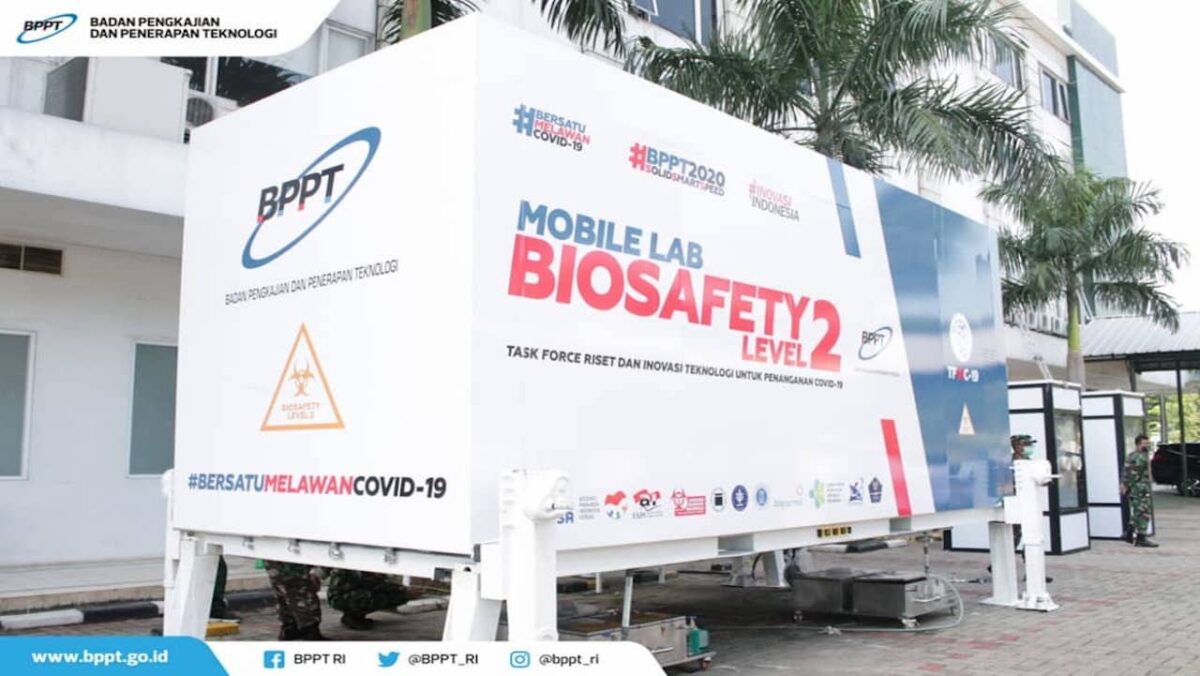 HSP Partner Dr. Diah Iskandriati, IPB University, worked with a consortium of partners led by the Ministry of Research and Technology/National Research Agency (Kemristek/BRIN) to develop a mobile Biosafety Level 2 (BSL-2) lab to respond to health emergencies, such as COVID-19 around the country. This lab can be shipped anywhere by land, air or sea, and allows Indonesia to reach underserved populations, while ensuring that proper biosafety and biosecurity standards are met.
HSP Partner Dr. Diah Iskandriati, IPB University, worked with a consortium of partners led by the Ministry of Research and Technology/National Research Agency (Kemristek/BRIN) to develop a mobile Biosafety Level 2 (BSL-2) lab to respond to health emergencies, such as COVID-19 around the country. This lab can be shipped anywhere by land, air or sea, and allows Indonesia to reach underserved populations, while ensuring that proper biosafety and biosecurity standards are met.
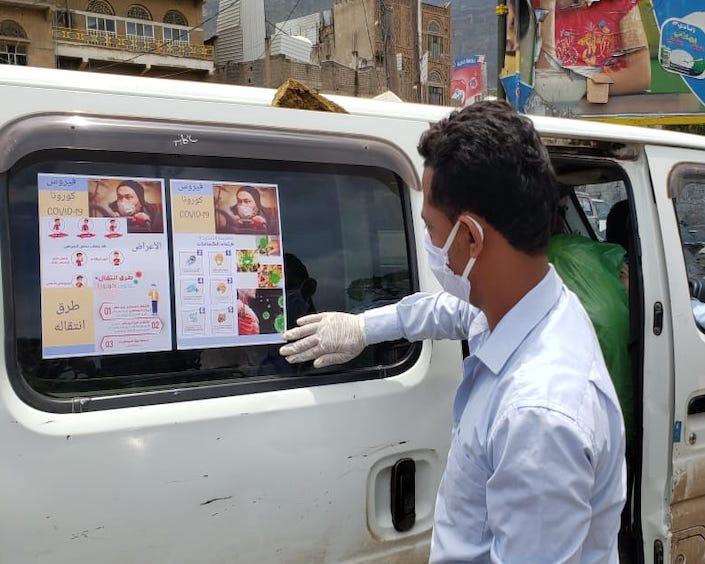 Protracted conflict has created the conditions for rampant and uncontrolled COVID-19 spread. In response, our Yemeni Health Security Futures Fellows have been acting as champions of health security and leveraging local resources to raise awareness, train health and laboratory professionals to enhance preparedness, and support the response to COVID-19 infections in their cities.
Protracted conflict has created the conditions for rampant and uncontrolled COVID-19 spread. In response, our Yemeni Health Security Futures Fellows have been acting as champions of health security and leveraging local resources to raise awareness, train health and laboratory professionals to enhance preparedness, and support the response to COVID-19 infections in their cities.
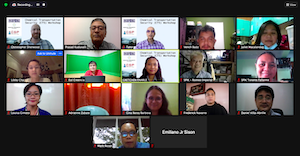 In the Philippines, HSP is working with the Chemical Industry Association of the Philippines (SPIK) to conduct a month-long, intensive virtual training on best practices for chemical transportation security (CTS). The program began on October 6th, 2020, bringing together 14 industry and university professionals from the chemical sector in the Mindanao region of the Philippines.
In the Philippines, HSP is working with the Chemical Industry Association of the Philippines (SPIK) to conduct a month-long, intensive virtual training on best practices for chemical transportation security (CTS). The program began on October 6th, 2020, bringing together 14 industry and university professionals from the chemical sector in the Mindanao region of the Philippines.

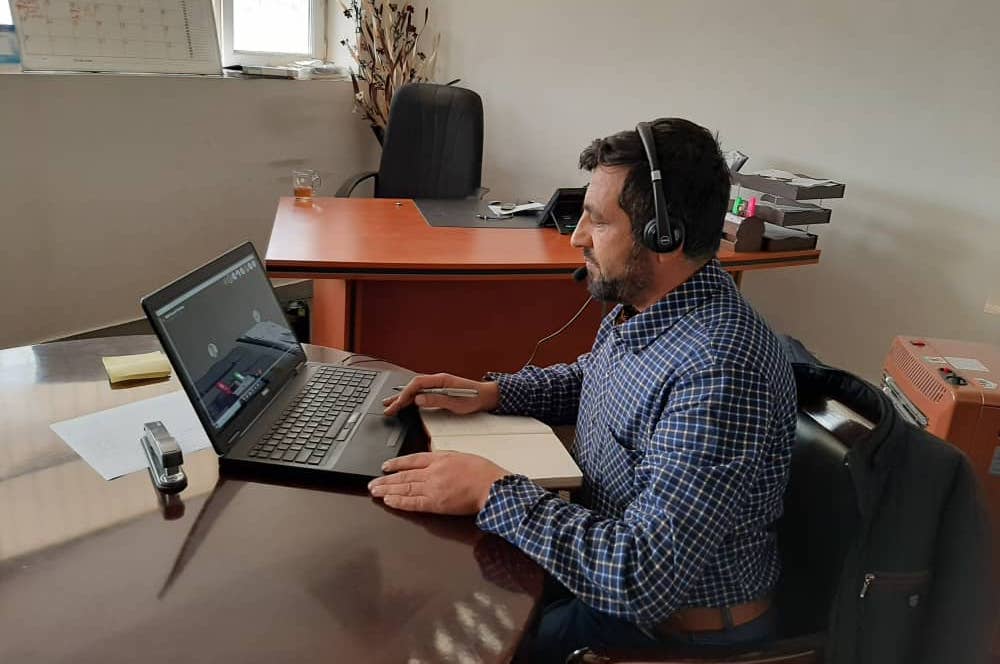
HSP Partners Dr. Wahid Bahir and Mr. Tawfiq Hussainkhil, have been holding virtual workshop sessions with personnel from eight of Afghanistan’s regional veterinary laboratories to help expand their biorisk management procedures and protocols. It is important these laboratories maintain the highest degree of biorisk management possible because they routinely deal with dangerous, zoonotic pathogens like Anthrax, Brucella, Crimean-Congo Hemorrhagic Fever (CCHF), as well as SARS-CoV-2 at certain labs.
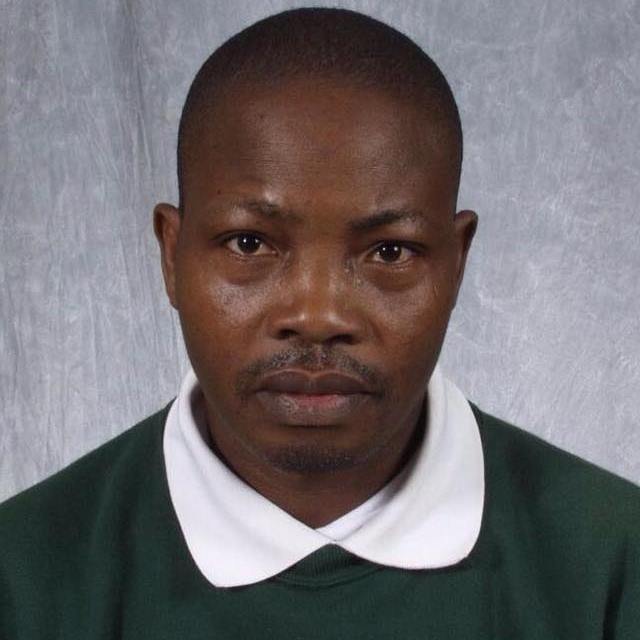 HSP is proud to announce a joint venture in Nigeria with the Fleming Fund, a British aid program that helps combat Antimicrobial Resistance (AMR) in low- or middle-income countries. The work will focus on the prevalence of AMR in different livestock populations. To help facilitate the project in Nigeria, HSP has hired Dr. Olufemi Olatoye, an experienced animal health epidemiologist, to serve as Animal Health Advisor. HSP is incredibly excited to have him on staff for the duration of this project.
HSP is proud to announce a joint venture in Nigeria with the Fleming Fund, a British aid program that helps combat Antimicrobial Resistance (AMR) in low- or middle-income countries. The work will focus on the prevalence of AMR in different livestock populations. To help facilitate the project in Nigeria, HSP has hired Dr. Olufemi Olatoye, an experienced animal health epidemiologist, to serve as Animal Health Advisor. HSP is incredibly excited to have him on staff for the duration of this project.
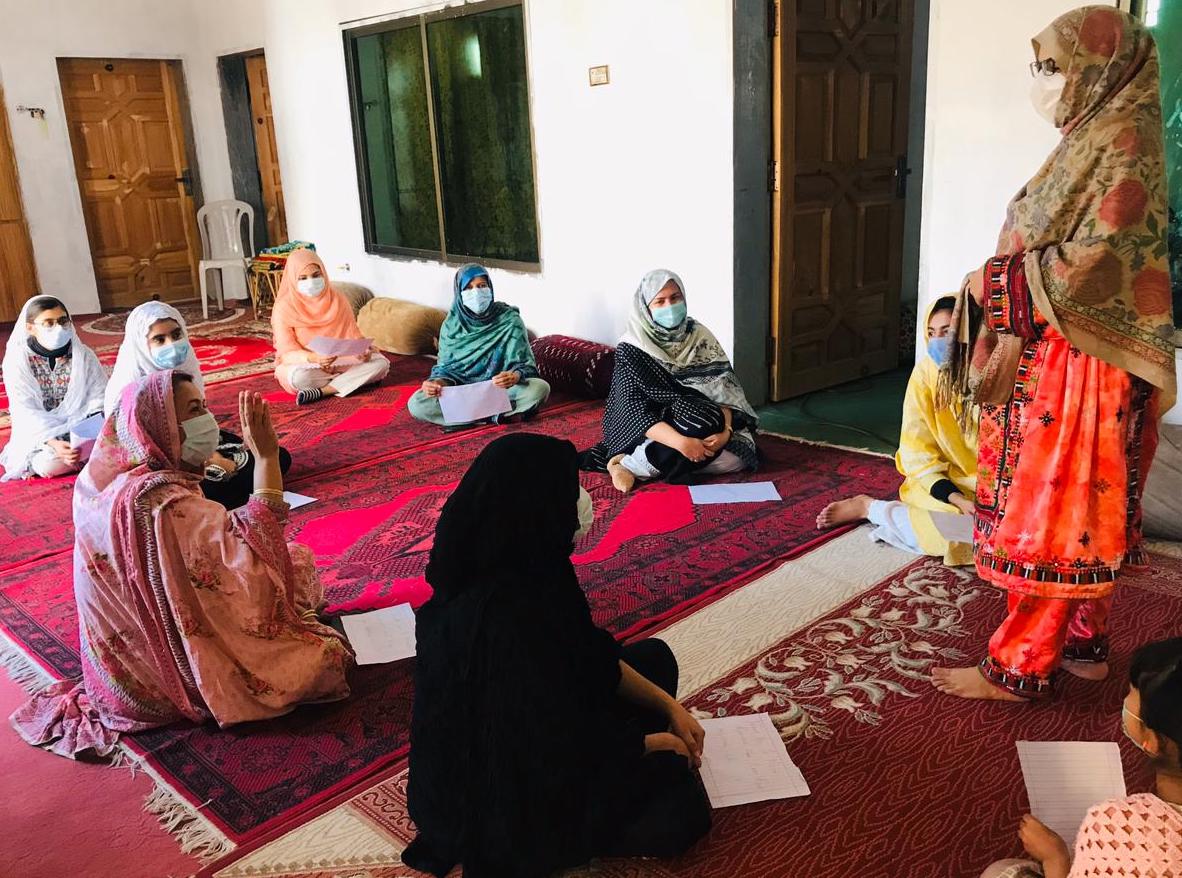 In Pakistan, HSP and Association for Biorisk Management (ABM) staff member, Dr. Mahzaib Malik, recently held a training with ten Lady Health Workers, who specialize in healthcare for women and children, in order to help raise awareness about COVID-19. Given societal norms in Pakistan, female community health workers provide essential healthcare services to women and children in impoverish urban and rural areas, where there can be a lack of information about COVID-19 and how to prevent it.
In Pakistan, HSP and Association for Biorisk Management (ABM) staff member, Dr. Mahzaib Malik, recently held a training with ten Lady Health Workers, who specialize in healthcare for women and children, in order to help raise awareness about COVID-19. Given societal norms in Pakistan, female community health workers provide essential healthcare services to women and children in impoverish urban and rural areas, where there can be a lack of information about COVID-19 and how to prevent it.
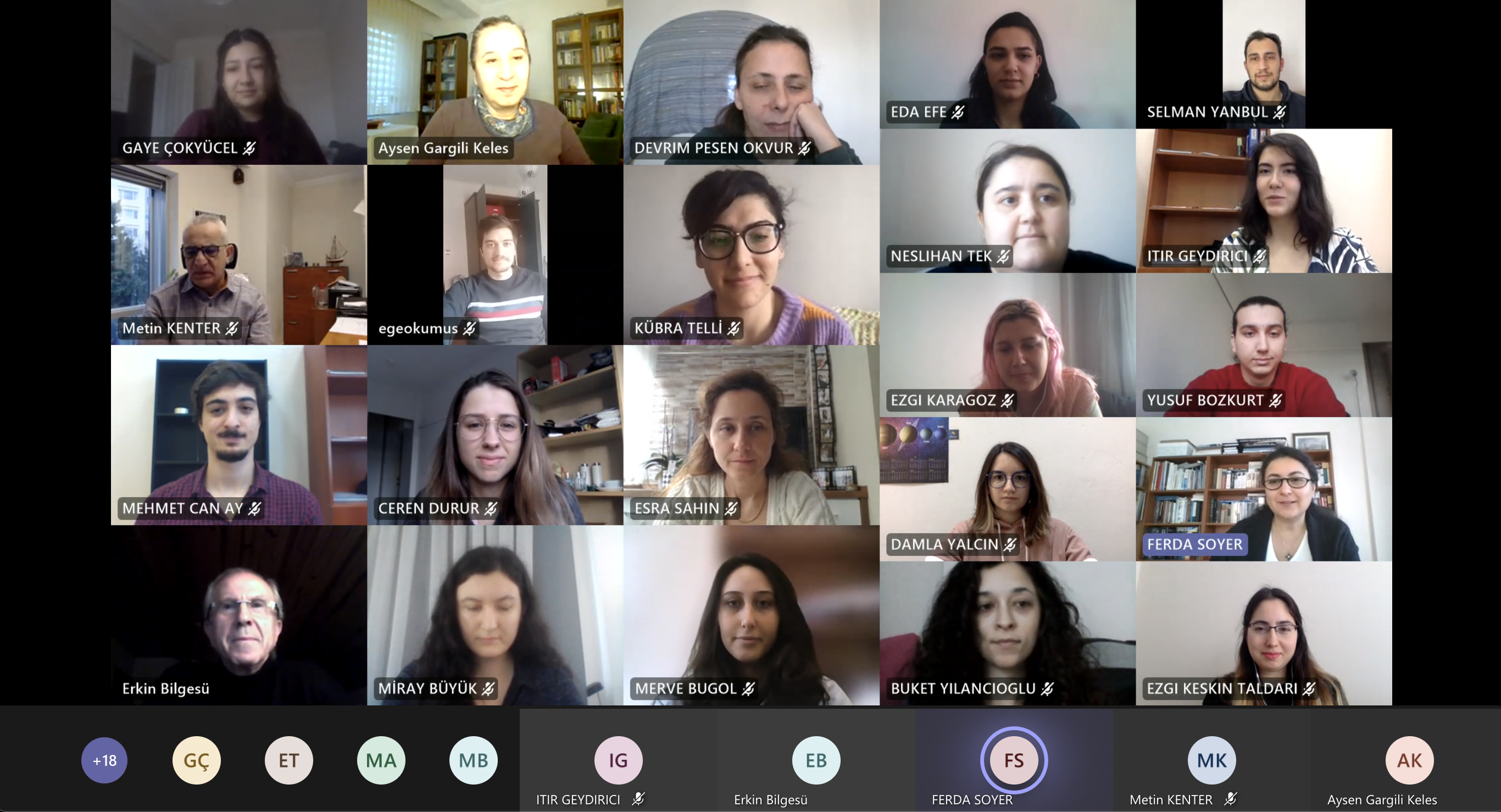 HSP convened a group of thirty student laboratory personnel and faculty members from the Izmir Institute of Technology (IYTE), to help reinforce and strengthen the biorisk management practices at the university’s labs. At IYTE’s labs, pathogens like Brucella and Crimean-Congo Hemorrhagic Fever, are routinely studied as part of the university’s research program. Thus, creating the need for a laboratory environment with the utmost biosafety and biosecurity. During the one-day workshop, students were given biosafety-themed tasks that had to be completed in real-time and then shown via webcam or smartphone. The training also gave the students the opportunity to engage with Turkish engineering firm, INSEL Systems, to identify biorisks and possible engineering controls in their respective laboratories.
HSP convened a group of thirty student laboratory personnel and faculty members from the Izmir Institute of Technology (IYTE), to help reinforce and strengthen the biorisk management practices at the university’s labs. At IYTE’s labs, pathogens like Brucella and Crimean-Congo Hemorrhagic Fever, are routinely studied as part of the university’s research program. Thus, creating the need for a laboratory environment with the utmost biosafety and biosecurity. During the one-day workshop, students were given biosafety-themed tasks that had to be completed in real-time and then shown via webcam or smartphone. The training also gave the students the opportunity to engage with Turkish engineering firm, INSEL Systems, to identify biorisks and possible engineering controls in their respective laboratories.
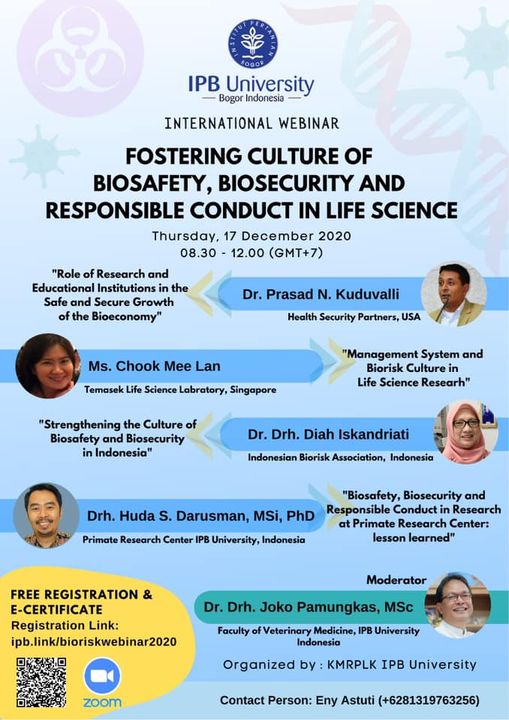 HSP’s Director of Scientific Programs and Engagement, Dr. Prasad Kuduvalli, was invited to speak at IPB University’s international webinar on biosafety, biosecurity, and responsible conduct in science. During the webinar, which occurred on December 20th, 2020, Dr. Kuduvalli discussed how cutting-edge research at universities is integral to growing the bio-economy and how institutional oversight mechanisms should be put in place, to protect this research from misuse or exploitation by bad actors.
HSP’s Director of Scientific Programs and Engagement, Dr. Prasad Kuduvalli, was invited to speak at IPB University’s international webinar on biosafety, biosecurity, and responsible conduct in science. During the webinar, which occurred on December 20th, 2020, Dr. Kuduvalli discussed how cutting-edge research at universities is integral to growing the bio-economy and how institutional oversight mechanisms should be put in place, to protect this research from misuse or exploitation by bad actors.
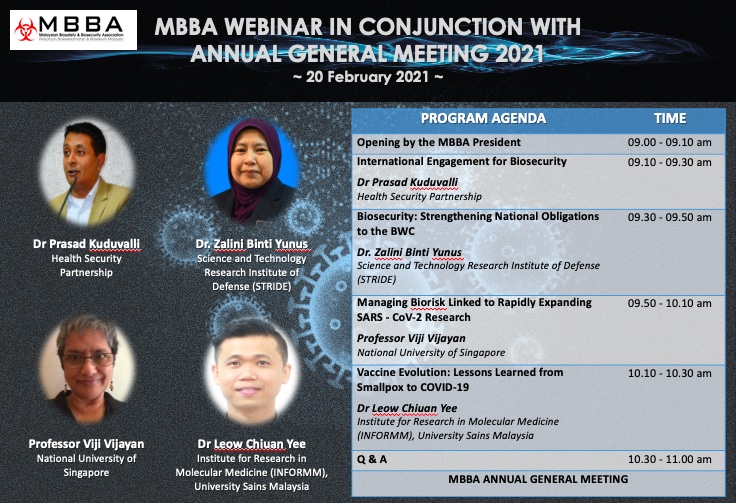 HSP’s Director of Scientific Programs & Engagement, Dr. Prasad Kuduvalli, delivered a presentation at the Malaysian Biosafety & Biosecurity Association (MBBA)’s annual general meeting. The presentation entitled, “International Engagement For Biosecurity”, covered current issues in biosecurity, such as threats from SARS-CoV-2, toxins, emerging biotechnologies, and gaps in capacity, as well as how HSP is working with regional partners to strengthen capacity to prevent misuse of biological materials and expertise.
HSP’s Director of Scientific Programs & Engagement, Dr. Prasad Kuduvalli, delivered a presentation at the Malaysian Biosafety & Biosecurity Association (MBBA)’s annual general meeting. The presentation entitled, “International Engagement For Biosecurity”, covered current issues in biosecurity, such as threats from SARS-CoV-2, toxins, emerging biotechnologies, and gaps in capacity, as well as how HSP is working with regional partners to strengthen capacity to prevent misuse of biological materials and expertise.